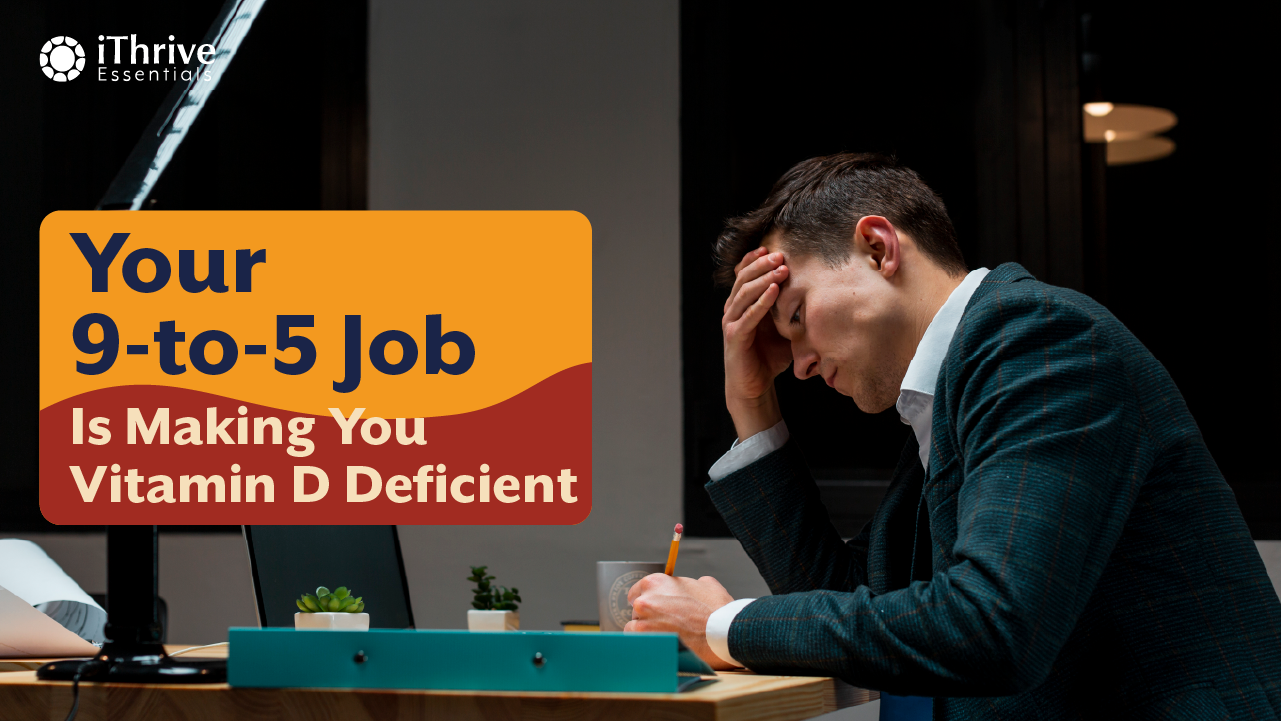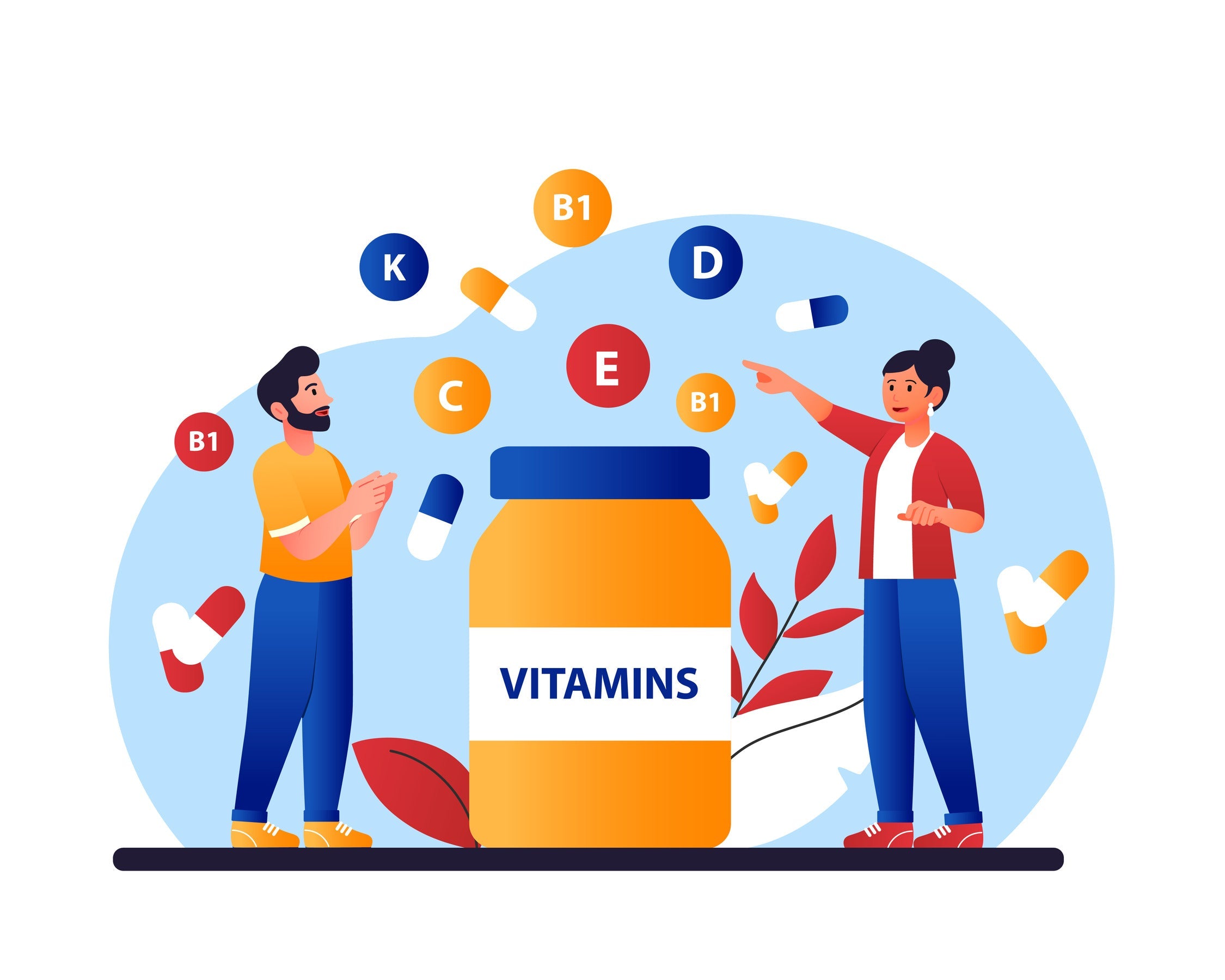
Is Your Job Making You Depressed, Or Is It Just a Vitamin D Deficiency?
Do you drag yourself to your desk every morning? Feel your energy crash by mid-afternoon? Find yourself snapping at colleagues over minor issues? When these feelings persist, it's easy to blame your job, boss, or the mounting deadlines.
But what if the real reason is hiding in plain sight?
More people today are struggling with unexplained mood swings, fatigue, and even symptoms of depression, especially office workers trapped under fluorescent lights and chronic stress. While workplace pressure certainly plays a role, there might be a silent factor making everything worse: vitamin D deficiency.
But does low vitamin D cause depression? The evidence is compelling. In this blog, we will explore the surprising connection between those office blues and your vitamin D levels, show you how to spot the warning signs, and offer practical solutions that fit into your busy work life.
What Is Vitamin D and Why Is It So Important for Mental Health?
That morning sunshine isn't just good for waking you up — it's essential for your mental health. Vitamin D isn't actually a vitamin but a hormone your body produces when your skin is exposed to sunlight. Despite its name, it functions more like a powerful chemical messenger that affects nearly every cell in your body.
The Mood Connection
- Brain Function: Vitamin D receptors exist throughout your brain, particularly in areas that regulate mood and behaviour.
- Serotonin Production: This "happiness hormone" depends on vitamin D for its creation and regulation. Without enough vitamin D, serotonin levels can plummet.
- Inflammation Control: Chronic inflammation is linked to depression, and vitamin D helps keep inflammation in check.
- Stress Hormone Regulation: Vitamin D helps regulate cortisol, your body's main stress hormone.
Beyond Mental Health
- Bone health and calcium absorption
- Immune system function
- Muscle strength and recovery
- Sleep quality
- Heart health
Where Do We Get Vitamin D?
Unlike other nutrients, getting adequate vitamin D is tricky because few foods naturally contain it. Your main sources are:
- Sunlight: Your skin produces vitamin D when exposed to UVB rays (the most efficient source)
- Diet: Fatty fish (salmon, mackerel), egg yolks, mushrooms, and fortified foods
- Supplements: Vitamin D3 (cholecalciferol) tablets or drops
Are You Deficient? Common Causes and Symptoms
Before you can address a vitamin D deficiency, you need to recognise the warning signs. Many office workers dismiss these symptoms as "just part of the job," but they could signal something more.
Why Office Workers Develop Vitamin D Deficiency

Beyond the obvious lack of sun exposure, several factors make office workers particularly vulnerable:
- Sedentary Indoor Lifestyle: Eight-plus hours under artificial lighting
- Air Pollution: Urban pollution can reduce UVB penetration by up to 60%
- Sunscreen Use: While protecting your skin, SPF 15 reduces vitamin D production by 99%
- Digital Lifestyle: Choosing screen time over outdoor activities during breaks
- Poor Diet: Relying on convenient but vitamin D-poor office snacks and meals
- Stress-Related Gut Issues: Chronic work stress can impair vitamin D absorption
The Science: Vitamin D Deficiency and Depression
Red Flag Symptoms of Vitamin D Deficiency
When vitamin D levels drop too low, many people experience symptoms that mirror clinical depression:
- Persistent feelings of sadness or emptiness
- Loss of interest in activities once enjoyed
- Increased irritability and frustration with coworkers
- Difficulty concentrating on work tasks
- Feeling overwhelmed by normal work responsibilities
- Social withdrawal from colleagues
- Changes in appetite or weight
- Physical complaints like headaches or digestive issues
These low vitamin D symptoms at work can seriously impact your performance and job satisfaction. The trouble is, many people (and even some doctors) don't make the connection between these symptoms and a possible vitamin D deficiency.

How Vitamin D Affects Your Brain Chemistry
Vitamin D doesn't just affect your mood — it changes your brain chemistry in several important ways:
- Serotonin Regulation: Vitamin D activates the genes that release serotonin, your brain's natural antidepressant.
- Dopamine Production: This "reward chemical" depends partly on adequate vitamin D levels.
- Glutathione Production: This powerful antioxidant protects brain cells from damage.
- Nerve Growth Factors: Vitamin D supports the growth and maintenance of nerve cells.
- Brain Inflammation: Vitamin D helps reduce neuroinflammation associated with depression.
Seasonal Affective Disorder and Office Life
Seasonal Affective Disorder (SAD) — a type of depression that occurs during darker months — shares many features with vitamin D deficiency. Office workers often experience a milder version known as "cubicle blues" or "office winter syndrome."
The modern office lifestyle creates a perfect storm for vitamin D deficiency and depression:
- Fluorescent lighting that doesn't trigger vitamin D production
- Climate-controlled environments that eliminate exposure to natural elements
- Prolonged sitting reduces blood flow and energy levels
- High stress levels that deplete vitamin D stores faster
- Tech-centric culture that prioritises screen time over sunlight
This combination helps explain why depression rates have climbed alongside the shift to indoor knowledge work. Does low vitamin D cause depression? While it's not the only factor, the evidence suggests it plays a significant role, especially for those of us spending our days in offices.
Who's Most at Risk of Vitamin D Deficiency and Depression?
While anyone can develop vitamin D deficiency, certain groups face much higher risks, especially in office environments:
High-Risk Occupations and Individuals
- Indoor Office Workers: Particularly those in windowless environments or night shifts
- People with Darker Skin: Melanin reduces vitamin D production from sunlight
- Those Over Age 50: Ageing skin produces less vitamin D (up to 50% less by age 65)
- People with Higher Body Fat: Vitamin D gets trapped in fat cells, reducing blood levels
- Those with Digestive Disorders: Conditions like IBS, Crohn's, and celiac disease impair absorption
- People Taking Certain Medications: Including some antidepressants, corticosteroids, and weight loss drugs
The Burnout Connection
There's a troubling relationship between vitamin D deficiency, depression, and burnout:
- Vitamin D deficiency can contribute to early burnout symptoms
- Burnout further depletes vitamin D reserves
- This creates a downward spiral where each condition worsens the other
When you're already dealing with office stress and depression, a vitamin D deficiency adds yet another burden to your mental and physical resources.
Workplace Sunlight Strategies

Even with a busy office schedule, you can increase your sun exposure:
- Morning Commute: Park farther away or get off public transit a stop early.
- Lunch Outside: Even 15 minutes of midday sun exposure can help.
- Walking Meetings: Suggest taking discussions outside when possible.
- Break Routine: Step outside for 5–10 minutes several times during your workday.
- Office Location: If possible, choose a desk near a window.
- Seasonal Adjustment: During summer, less time is needed (10–15 minutes); during winter, aim for 20–30 minutes when possible.
Remember: For vitamin D production, direct sunlight on exposed skin is necessary. UVB rays don't penetrate glass, so sitting near a window isn't enough.
Dietary Sources
While food alone rarely provides enough vitamin D, these options can help boost your levels:
- Fatty Fish: Salmon (3.5 oz provides about 400 IU), mackerel, sardines
- Egg Yolks: Especially from free-range chickens (about 40 IU per yolk)
- Mushrooms: Particularly those exposed to UV light during growth
- Fortified Foods: Milk, orange juice, cereals, yoghurt (check labels)
- Cod Liver Oil: A traditional but effective source (1 tablespoon provides about 1,300 IU)
Supplement Strategy
When it comes to your health, you deserve the best, and iThrive Essentials Vitamin D3 + K2 with MCT Oil takes your supplements to the next level. Packed with wild-crafted, natural Vitamin D3, MK7 Vitamin K2, and MCT oil, our advanced liquid formula is designed for maximum absorption. This means your body gets every ounce of these essential nutrients - no more wasted supplements!
Final Thoughts: Don't Ignore What Your Mood Might Be Telling You
That persistent low mood, energy crash, or feeling of being overwhelmed at work might not just be "the job" - it could be a sign your body is missing something essential. The connection between vitamin D deficiency and depression, particularly for office workers, deserves more attention than it typically receives.
Consider this: while modern office life has given us climate control, technology, and convenience, it's taken away something our bodies have relied on for thousands of years—regular sun exposure. This isn't just about getting a tan; it's about producing a crucial hormone that affects everything from your mood to your immune system.
For office workers facing constant stress and minimal sunlight, addressing vitamin D status should be part of any mental health strategy. The good news is that vitamin D deficiency is one of the most easily correctable nutritional deficiencies.
Your Next Steps
- Get Tested: Ask your doctor for a vitamin D blood test, especially if you're experiencing mood symptoms.
- Create a Sunlight Strategy: Plan your workday to include brief outdoor breaks when possible.
-
Consider Supplementation: Discuss appropriate
Don't dismiss your workplace blues as just part of the job. Your body might be telling you something important; listen to it. Taking action on your vitamin D levels could be the first step toward reclaiming your energy, focus, and joy, both at work and beyond.



Leave a comment
This site is protected by hCaptcha and the hCaptcha Privacy Policy and Terms of Service apply.